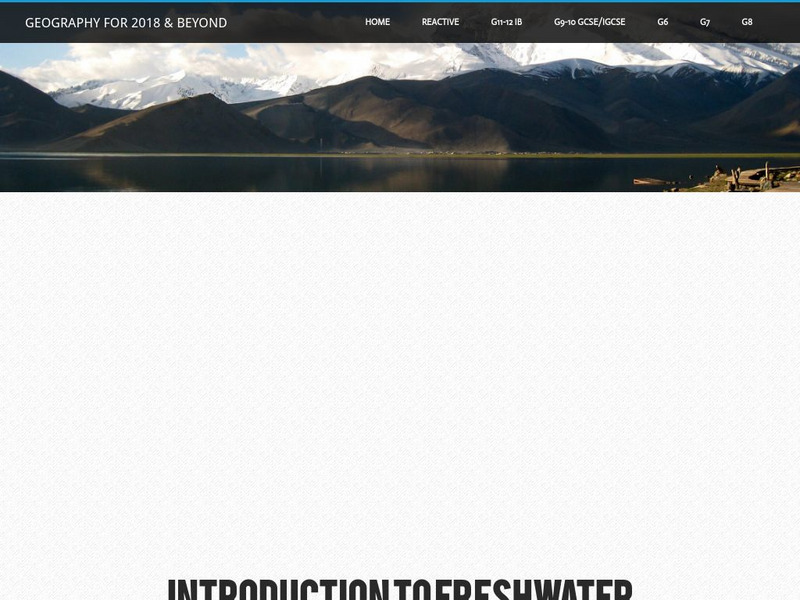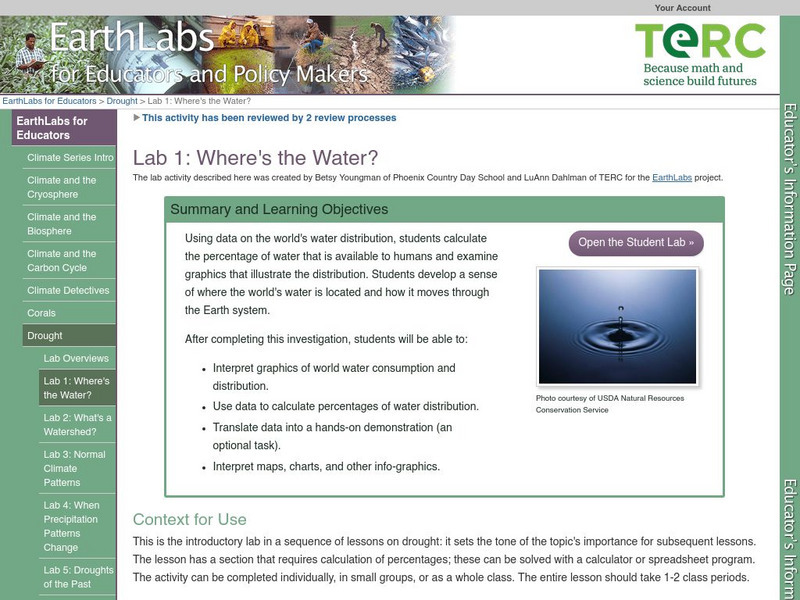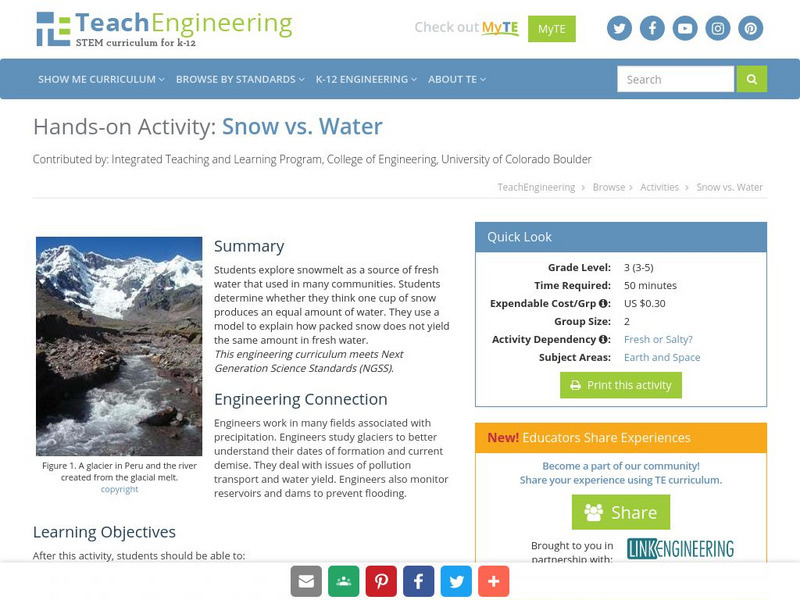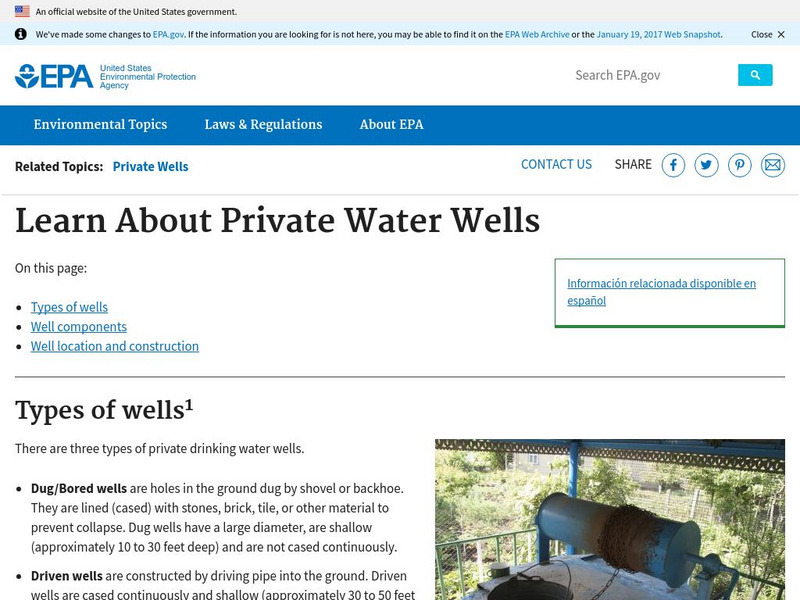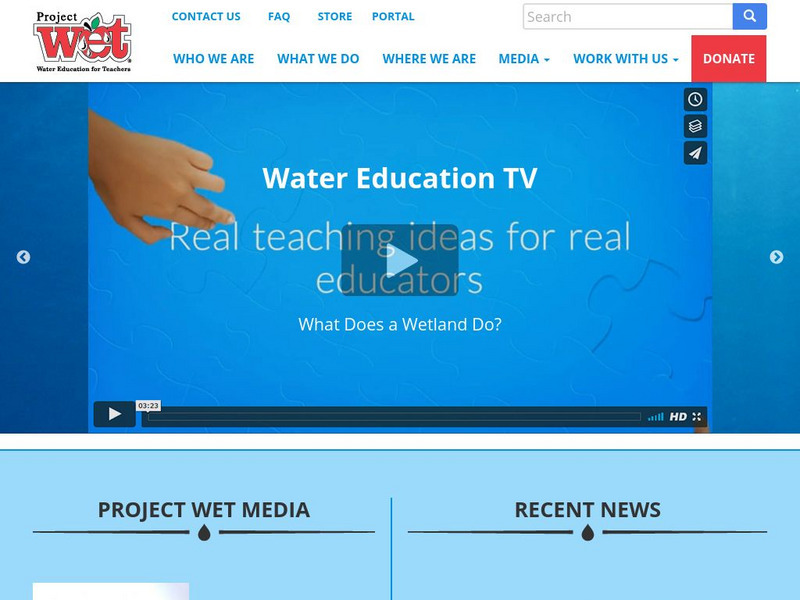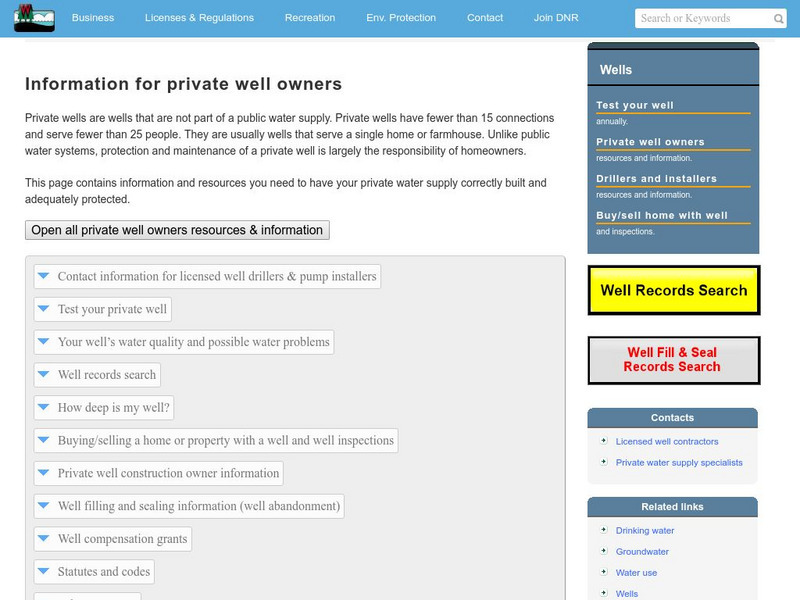eSchool Today
E School Today: Your Cool Basics on Water Shortage
Despite seventy percent of the world's surface being covered with water, there is a potential shortage of this natural resource. Only a small percentage is fresh water and much of that is inaccessible or threatened. Learn about fresh...
Geographypods
Geographypods: Freshwater: Issues and Conflicts: The Water System
This learning module examines the Earth's stores of fresh water and how the balance between stores of water in the oceans and in ice is changing. Students then investigate how a maximum sustainable amount of freshwater can be achieved by...
Other
Freshwater Ecoregions of the World
The World Wildlife Fund and the Nature Conservancy have compiled a comprehensive database about the freshwater regions of the world. Includes great interactive maps to find detailed information about any area of interest. Explore what's...
US Geological Survey
Usgs: Water Science for Schools Water Science Storytime!
This U.S. Geological Survey website features a fictious town, Dryville, and uses it to illustrate every aspect of water management that you might encounter. Click Home to access the site in Spanish.
US Geological Survey
Usgs: Water Science for Schools Activities Center
This website offers three activity centers: Questionnaires, Opinion Surveys, and Challenge Questions. Take a look at these interesting water research activities from the US Geological Survey. Click Home to access the site in Spanish.
Other
Nutrition Action: Water, Water, Everywhere
The Center for Science in the Public Interest offers a discussion of contaminants that can be found in tap water and chemicals added to water in the public water systems. The topics discussed are arsenic, parasites, lead, turbidity, and...
Science Education Resource Center at Carleton College
Serc: Lab 1: Where's the Water?
A lab experiment in a series of experiments that explores drought. Here students look at the availability of world's fresh water by investigating graphics and analyzing data to see where the world's water supply is going.
TeachEngineering
Teach Engineering: How Much Water Do You Use?
Students keep track of their own water usage for one week, gaining an understanding of how much water is used for various everyday activities. They relate their own water usages to the average residents of imaginary Thirsty County, and...
TeachEngineering
Teach Engineering: Snow vs. Water
Engineers work in many fields associated with precipitation. Engineers study glaciers to better understand their dates of formation and current demise. They deal with issues of pollution transport and water yield, and they monitor...
TeachEngineering
Teach Engineering: One World Ocean
In this activity, students learn about ocean currents and the difference between salt and fresh water. They use colored ice cubes to see how cold and warm water mix and how this mixing causes currents. Also, students learn how surface...
TeachEngineering
Teach Engineering: Natural and Urban Stormwater Water Cycles
Through an overview of the components of the hydrologic cycle and the important roles they play in the design of engineered systems, students' awareness of the world's limited fresh water resources is heightened. The lesson lays the...
Nature Conservancy
Nature Conservancy: Planet Earth: Rivers and Lakes
A comprehensive exploration of rivers and lakes, their importance to biodiversity and to humans, how we use them, threats they face, and what is being done to conserve them.
US Environmental Protection Agency
Epa: Private Drinking Water Wells
Provides information on what to do after a flood to protect well water from contamination, the testing of private well water, and protecting private well water.
Other
Project Wet Water Education for Teachers
Non-profit education program dedicated to increasing awareness of water resources through classroom activities and hands-on experience. Lesson plans designed for K-12 students. Site available in English, Spanish, and French.
My Science Site
Environment Canada: Clean Water: Life Depends on It! [Pdf]
An extensive lesson unit on water quantity and quality and why it is important in relation to human life. Provides lessons that incorporate language, social studies, geography, and health. Tests are also provided. This is one chapter of...
Wisconsin Department of Natural Resources
Wdnr: Information for Homeowners With Private Wells
Provides information about water quality, contamination in private wells, well construction and pump installation for private wells, a list of laboratories certified to test for bacteria and other contaminants, recommendations for...
Center for Innovation in Engineering and Science Education, Stevens Institute of Technology
Ciese Collaborative Projects: The Global Water Sampling Project
By testing your local water quality, you will be able to compare your results with students around the world. Register your class, and follow the project instructions. Additional teacher resources, references, and Ask-an-Expert sources...
Pacific Institute
Pacific Institute: The World's Water
Water resources are under threat around the world. WorldWater.org is a repository of information related to issues that should concern all of us. There is also a searchable database of literature and research devoted to freshwater issues.
US Geological Survey
U.s. Geological Survey: Groundwater Information by Topic
A massive amount of information about groundwater. Topics covered include groundwater basics, humans and groundwater, groundwater quality, and its place in the water cycle. Includes true-and-false quiz and a Q&A section, as well as a...
National Wildlife Federation
National Wildlife Foundation: What We Do to Protect the Great Lakes
A description of the various projects of the National Wildlife Foundation to protect the Great Lakes. Includes links to further information.
Center for Educational Technologies
Nasa Classroom of the Future: Florida Everglades
This site is full of information and activities to help learn about the Florida Everglades, a unique wetland environment, and its future.
Utah Education Network
Uen: A Drop in the Bucket: Usu Water Cycle
Learn about the different sources of fresh water.
NASA
Nasa: Polar Ice and Its Possible Effects on the Earth
This article describes the effects of polar ice caps on the Earth and offers explanations as to the possible effects of polar ice melting on sea level and temperature.
E-learning for Kids
E Learning for Kids: Science: Ocean Center: Why Do We Need to Conserve Water?
Go aboard on a cruise ship with Denise and her family. Help her learn about water conservation, and why it is important.



